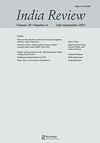Internationalizing the Kashmir dispute: an analysis of India and Pakistan’s statements at the United Nations General Assembly
IF 0.6
3区 社会学
Q3 AREA STUDIES
引用次数: 1
Abstract
ABSTRACT No other issue has influenced the India–Pakistan relationship more adversely than the Jammu and Kashmir dispute. To understand the discourse surrounding the dispute, and how it has evolved within the foreign policies of both countries, this research undertakes a critical discourse analysis of both countries’ official statements at the United Nations General Assembly (UNGA) between 1948 and 2020. The findings of this study are crucial to not only understanding how the two states have been internationalizing the Kashmir dispute but also what lessons can be learned from the past as both countries attempt to slowly reengage with one another. Our analysis points to the fact that both India and Pakistan’s stances on the Kashmir dispute, despite their varying phases throughout the conflict, have essentially remained the same. We argue that, despite seeming to have converged toward some form of resolution during the first decade of the twenty-first century, the current context of India–Pakistan relations presents a worsening trajectory that has not been witnessed since their last major war in 1971. In highlighting the cyclical, almost scripted nature of this debate, this paper attempts to suggest ways to break free from age-old tropes and help pave the way toward more meaningful ways to redefine the issue in light of a radically altered geo-political context.克什米尔争端国际化:印度和巴基斯坦在联合国大会上的发言分析
没有其他问题比查谟和克什米尔争端对印巴关系的影响更大。为了理解围绕这一争端的话语,以及它是如何在两国的外交政策中演变的,本研究对1948年至2020年两国在联合国大会(UNGA)上的官方声明进行了批判性话语分析。这项研究的结果不仅对了解两国如何将克什米尔争端国际化至关重要,而且对于了解在两国试图慢慢重新接触的过程中可以从过去吸取什么教训至关重要。我们的分析指出,印度和巴基斯坦在克什米尔争端上的立场,尽管在整个冲突中处于不同的阶段,但基本上保持不变。我们认为,尽管在21世纪的第一个十年,印巴关系似乎趋向于某种形式的解决方案,但目前的印巴关系呈现出自1971年两国上一次重大战争以来从未出现过的恶化轨迹。在强调这场辩论的周期性、几乎照本宣本的本质时,本文试图提出摆脱古老比喻的方法,并在地缘政治背景急剧变化的情况下,为更有意义地重新定义这一问题铺平道路。
本文章由计算机程序翻译,如有差异,请以英文原文为准。
求助全文
约1分钟内获得全文
求助全文

 求助内容:
求助内容: 应助结果提醒方式:
应助结果提醒方式:


